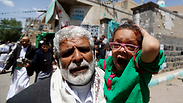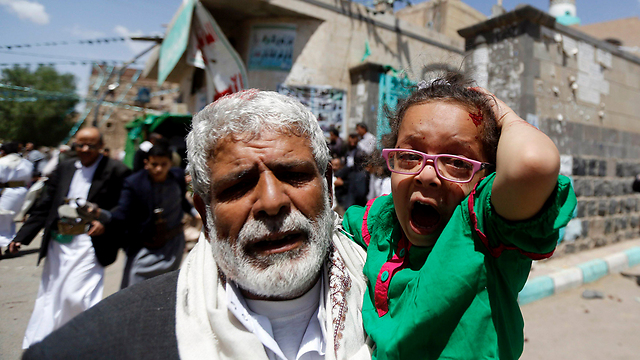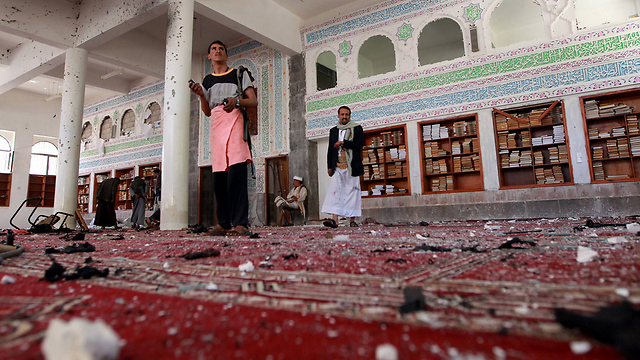
Islamic State, an al-Qaeda offshoot that has seized large areas of Iraq and Syria, has claimed responsibility for the blasts in the mosques, which are used mainly by supporters of the Shiite Muslim Houthi group which has seized control of the government.
One suicide bomber struck inside Badr mosque in southern Sana'a while another targeted worshippers as they fled outside, witnesses said. The third suicide bomber targeted Al-Hashahush mosque in northern Sana'a.
The Houthi militia's Al-Massira television said hospitals in the capital had made urgent appeals for blood donations.
Leading Houthi cleric Al-Murtada bin Zayd al-Muhatwari, the imam of the Badr mosque, was among those killed, a medical source said.
There was no immediate claim of responsibility for the mosque bombings but supporters of Islamic State group used Twitter to welcome the attacks.
Footage aired by Al-Massira showed bodies lying in pools of blood outside the mosques, as worshippers rushed the wounded to hospitals in pick-up trucks.
Another suicide bomber blew himself up outside a mosque in the northern Houthi stronghold of Saada, a source close to the militia said. Only the assailant was killed in that explosion and tight security at the mosque prevented the bomber from going inside, the source added.
The Houthis overran Sana'a in September and have since tightened their grip on power.
Their attempts to extend their control into other areas have been met by deadly resistance from Sunni tribes and al-Qaeda. Yemen's top security body blamed al-Qaeda for a car bomb in January that killed 40 people and wounded dozens more at a police academy in Sana'a as recruits lined up to register.
But a leader of the jihadist network denied responsibility at the time.
Front line against al-Qaeda
Al-Qaeda in the Arabian Peninsula (AQAP) is regarded by the United States as the extremist network's deadliest branch.
Yemen, a front line in the US war on al-Qaeda, has descended into chaos since the 2012 ouster of longtime strongman Ali Abdullah Saleh, who has been accused of backing the Houthis.
Tensions have risen since President Abedrabbo Mansour Hadi fled to Aden in February after escaping a month of house arrest in Sana'a by Houthi forces in control of the capital.
Following the Houthi takeover of Sana'a, Saudi Arabia and other Gulf countries moved their embassies to Aden and several Western missions closed their doors in the capital because of security concerns.
Hadi has been trying to consolidate his hold over Aden, the better to mount a challenge to the Houthis' ambitions to control the whole country.
Thirteen people were killed on Thursday when forces loyal to Hadi fought their way into Aden's international airport and wrested an adjacent military base from a renegade officer, Aden governor Abdulaziz bin Habtoor said.
Both the fighting on the ground and subsequent air attack appeared to be part of a deepening power struggle between Hadi and the Houthi group, which is allied with former president Ali Abdullah Saleh, a fierce critic of Hadi.
On Friday, a cautious calm returned to Aden as the Yemeni president appeared to be consolidating his control over the city. The airport reopened and flights resumed as normal, an airport official told Reuters.
AFP and Reuters contributed to this report.

















